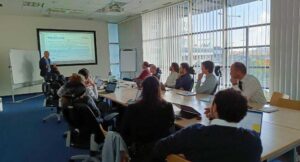The translation of Molière’s vision into practical use cases was one of the key discussions which guided the full consortium meeting held in the EUSPA’s headquarters between 18th and 20th October 2022. Five pilot tests with different objectives have now been designed and are ready to be fully developed for deployment during 2023, all of them demonstrating the real potential and benefits of a secure, highly accurate and trusted Mobility Data Marketplace (MDM) as enabled by Galileo.
The five use cases are based on specific mobility matters which have already been determined to benefit from the use of Molière’s MDM. At the same time, Molière’s proposed solutions have been defined by ensuring they are not independent from each other: altogether, they will be key contributors to demonstrating an integrated solution is possible to general issues such as congestion or segregated connectivity in the benefit of cities and regions, understanding and treating them as the live and inter-connected ecosystems they are.
The foundations of these five solutions are now being built upon demonstrating Molière’s vision can become a reality soon.

The first use, designed by Dott and Keita, will get Galileo-based geofencing data to subsidise individual micromobility trips in areas of Brussels with low public transport connectivity, or which are socio-economically disadvantaged. This way, it will demonstrate how Molière can make micromobility more inclusive across wider metropolitan regions through the use of open, accurate and reliable geolocation data from Galileo.
Secondly, Keita and Iomob, in collaboration with Cyclerap, will evidence the real usability of collecting and simplifying geolocalised visual data while cycling, to identify best cycling routes and detect required infrastructure improvements.
Iomob and Octo Telematics, in collaboration with MEC, will in addition demonstrate that a secure and reliable data sharing mechanism is possible by developing a way to verify that mobility services are really being delivered. This will be applied to Molière’s MDM and blockchain mechanisms to prevent offered token incentives to MaaS providers and users from being subject of fraud.
In the meantime, Nemi will deploy a multi-modal integration tool which will use Galileo geolocation data for virtual bus stops accurate detection, route validation for data quality improvement, and route’s driven length justification. The data, as introduced in Molière’s MDM, will help public transport authorities and operators improve services and optimise networks’ operation. Nemi’s use case will also help design and implement efficient demand-responsive transport services for areas where traditional public transport may not be the best answer.
Last but not least, the UPC will showcase the analysis conducted in the Moliere space by working primarily with satellite-based positioning data such as Galileo from bus lines in Barcelona. The insights derived from such analysis are resulting in a bus service prediction algorithm which, if applied to data as extracted from the MDM, will help transit agencies better design and plan their fixed routes and optimise the behaviour of their networks.
Overall, Molière partners have fixed a route to ensuring the successful deployment of the MDM as based on Galileo and underpinned by blockchain technology. This way, the global vision of the project is to become a reality: “promoting more sustainable, affordable, equitable, and accessible mobility where micromobility and shared mobility services increasingly complement public transport, with the goal to reduce dependence on single occupancy private vehicles”.



